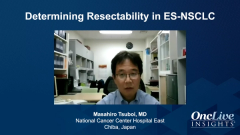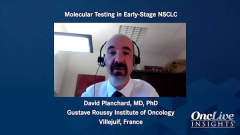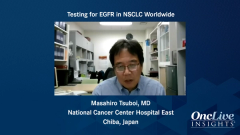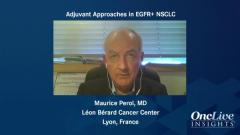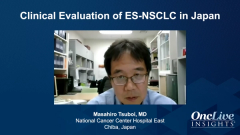
Practical Implications of ADAURA in NSCLC
Episodes in this series

Transcript:
Maurice Perol, MD: ADAURA was a practice-changing trial. The magnitude of DFS [disease-free survival] improvement in this trial, especially with the reduction in the brain metastases rate, is enough to change our practice, even if we do not have yet the certainty of overall survival benefit. The proportion of patients experiencing recurrences in the control arm, especially for patients with stage II and III disease and despite the use of adjuvant chemotherapy for approximately 75% of these patients, is consistent with the clinical practice. This proportion of patients with recurrences is very high, and that justifies prevention of these relapses due to the clinical impact, especially for the brain metastasis and the quality of life.
Today the use of osimertinib in the adjuvant setting after surgical resection of EGFR-positive non–small cell lung cancer will change the treatment paradigm for these patients. As I said, I do not think we have to drop adjuvant chemotherapy if indicated because ADAURA included patients receiving adjuvant chemotherapy if they were fit to receive this treatment. In the future, we need more follow-up for this study, especially for the overall survival but also about some data on the treatment for recurrences in the control arm. What proportion of patients will receive osimertinib at the time of disease relapse vs another TKI [tyrosine kinase inhibitor] vs no TKI at all, or more treatment? In the experimental osimertinib arm, a critical point will be the genomic characteristics of the recurrent disease and the treatment of relapses.
This is a critical point for considering the overall survival benefit. This benefit will be likely if the relapses in the osimertinib arm remain mostly sensitive to osimertinib. We can make them parallel with the SELECT trial, in which the patient received 2 years of adjuvant treatment with erlotinib; approximately 40 of 100 patients included in this single-arm study had relapses. The median time for these 40 patients was approximately 2 years, and the majority of patients were treated with erlotinib at the time of disease recurrence. The median duration of treatment with erlotinib given for these relapses was around 13 months, which is more or less in the range of the usual progression-free survival for patients with metastatic non–small cell lung cancer receiving erlotinib. This suggests that at the time of relapse in the osimertinib arm of the ADAURA trial, the disease would be still sensitive on osimertinib. If that is the case, an overall survival benefit would be very likely in this trial.
Another important perspective is to better select the patient needing an adjuvant treatment. If we knew the presence of minimal residual disease after a surgical resection—for example, with highly sensitive ctDNA [circulating tumor DNA] determination detection—this knowledge would be critical in identifying patients who really need adjuvant treatment and preventing giving unnecessary and costly treatment to other patients without detection of minimal residual disease. We need very sensitive ctDNA detection to determine if there is minimal residual disease after surgical resection. We need tumor information…that may be necessary for this sensitive detection of ctDNA. This also underscores the need for genomic testing of any tumor, any non–small cell lung cancer, even in early stage of the disease. This is crucial for obtaining the genomic profile of the tumor, as well as the presence of an oncogene addiction. It could also personalize the detection of minimal residual disease with ctDNA.
Transcript Edited for Clarity


